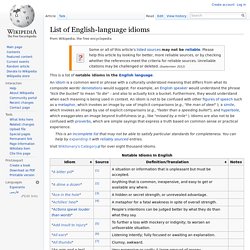

No Fear Shakespeare: Shakespeare's plays plus a modern translation you can understand. Harry's Blues Lyrics Online, Blues Language page. Slanguage. Living Languages. Language in Life. EDUCATION. Language Etymology. All In Name. Slanguage. Alphabetical list of idiomatic expressions. List of idioms in the English language. This is a list of notable idioms in the English language.

An idiom is a common word or phrase with a culturally understood meaning that differs from what its composite words' denotations would suggest. For example, an English speaker would understand the phrase "kick the bucket" to mean "to die" – and also to actually kick a bucket. Furthermore, they would understand when each meaning is being used in context. An idiom is not to be confused with other figures of speech such as a metaphor, which invokes an image by use of implicit comparisons (e.g., "the man of steel" ); a simile, which invokes an image by use of explicit comparisons (e.g., "faster than a speeding bullet"); and hyperbole, which exaggerates an image beyond truthfulness (e.g., like "missed by a mile" ). Idioms are also not to be confused with proverbs, which are simple sayings that express a truth based on common sense or practical experience.
Visit Wiktionary's Category for over eight thousand idioms. See also[edit] Common Phrases, Popular Sayings, Idiom List - Meanings and Origin. Find out the meanings of common sayings. Wrought with meaning. Language Expresses. Fuzzi logi. Language Learning. Lingua Franca. Category:English nonce terms. Definition from Wiktionary, the free dictionary » English language » Terms by etymology » Nonce terms English terms that have been invented for a single occasion.

[edit] The following 200 pages are in this category, out of 236 total. (previous 200) (next 200)(previous 200) (next 200) Category:Nonce terms by language. ClichéSite.com - The largest collection of clichés or cliches, phrases and sayings with definitions and explanations. SF Citations for OED. This site is maintained by Jesse Sheidlower, Editor at Large of the Oxford English Dictionary.

The content side of things is handled by Jeff Prucher and Malcolm Farmer. The project grew out of regular work that was being done for the OED's reading programs. Briefly, research for the OED takes two main forms: general reading, in which a variety of texts are read for any interesting words that are encountered, and targeted research, in which particular terms are specifically analyzed. This can consist of doing searches in electronic databases, sending general researchers to a library to see what they can find, or asking specialists for help in their subject fields. The purpose of this site is, in effect, to bring together SF enthusiasts with detailed lists of what we need their help with. The site was started under the guidance of Mike Christie, an OED volunteer, and Sue Surova, a freelance researcher for the OED. Old Norse Motto Online: Create Life Motto in Old Norse. According to a definition, motto is a short expression of a guiding principle.

Mottos in ancient languages have always been popular, since they express such principles with authority and wisdom of the ancients. User friendly interface below helps to create online mottoes in Old Norse, the language of the Vikings. Catchy phrases that can be created using this tool may be also interpreted as Viking slogans or even battle cries. Such a motto would adorn a weapon as an inscription or shock enemies when shouted during a reenactment of a Viking battle. 1.